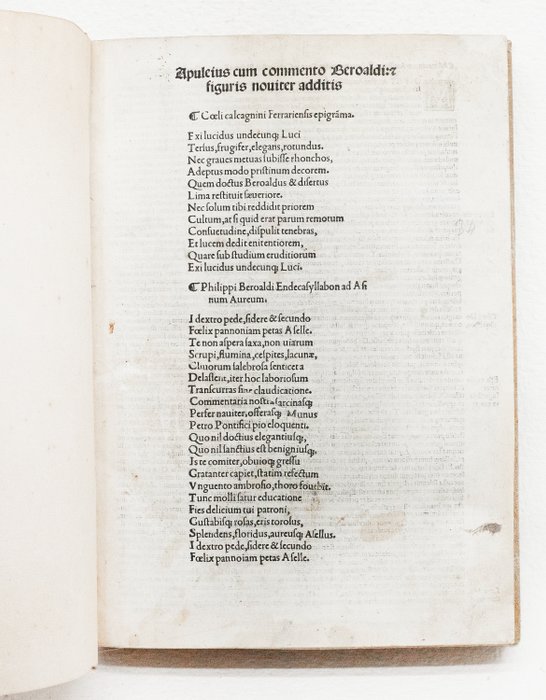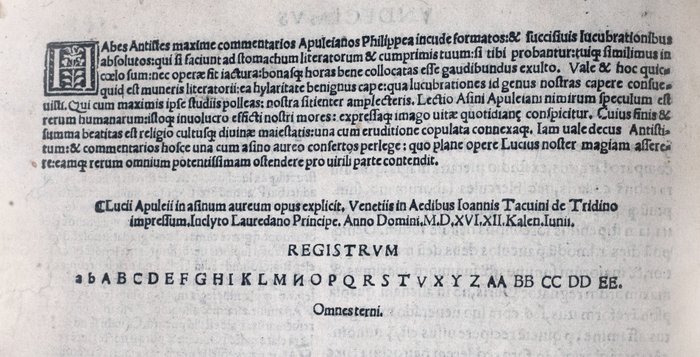Advert Description
Are you interested in this item? This item is up for auction at Catawiki. Please click on "respond to advert" (orange button) to get redirected to the Catawiki website. Catawiki’s goal is to make special objects universally available. Our weekly auctions feature thousands of unusual, rare, and exceptional objects you won’t find in just any store. INCUNABLE POST - IN FOLIO
BEAUTIFUL ILLUSTRATED EDITION of the Metamorphoses of Apuleius. The text is accompanied by the rich commentary by the humanist Filippo Beroaldo (1453-1505), which appeared for the first time in Bologna in 1500 (without illustrations) and was then reprinted several times. The series of figures is extremely effective in the representation of the scenes for liveliness and immediacy.
Numerous woodcuts representing the metamorphoses of Apuleius figurative drop caps, some on a black background.
Rare edition of Beroaldo's esteemed commentary on the Golden Donkey: appearing for the first time in Bologna in 1500 (without illustrations), it constituted the beginning of the literary fortune of the novel in the sixteenth century.
"EDITION WITH ILLUSTRATIONS" (Johns Hopkins University)
"What constitutes the major originality of this [edición] is the presence of grabados, which constitute the first intents to illustrate the peripecias of the novel [.] Los grabados, therefore, passed equally to other reprints of Beroaldo's text, such as also the Venetian one from 1516" (J.J. Martos Fernández, La Antiguëdad en el Fondo Antiguo de la Biblioeca de la Universidad de Sevilla, 2011, nr. 149). Edit 16, CNCE2224; Essling, 1323; Adams, A-1373; Sanders, 485.
CONTENTS
Apuleius' most FAMOUS WORK: "The Metamorphoses", the only novel in Latin dating back to Roman times that has come down to us in its entirety. It is divided into 11 books. The work is also known under the title The Golden Ass. The protagonist of the novel is the curious Lucius: at the end of the work it is revealed that he is a native of Madauro, the Numidian city where the author himself was born. Traveling in Thessaly, land of witches and spells, he feels an insatiable desire to see and practice magic: after smearing himself with a magic ointment, he finds himself accidentally transformed into a donkey.
Lucio Apulèio Madaurense (Madaura, 125 - Carthage, post 170), better known simply as Apuleius, was a Roman writer, philosopher and rhetorician of North African origins.
Filippo Beroaldo the Elder (1453-1505) was a highly erudite humanist, commented, with frequent digressions, on many Latin authors and edited the edition of others; he was also the author of some orations.
Essling; 1323. Sander 485. Casanatense; 106. Adams; A/1373. STC;p.35. Edit16 2226;
CONDITION REPORT
In folio. Leaves [14], 168 with many half-page woodcuts in the text and wood-engraved drop caps. Restorations on the lower corners of numerous leaves with slight loss of text, scattered stains, interesting handwritten glosses from the same period as the initial leaves. Modern vellum binding with gilt title on spine.
Second illustrated edition, following the first by Pinzi of 1510.
FULL TITLES & AUTHORS
Apuleius cum comment Beroaldi & figuris noviter additis
At the Colophon: Venetiis, In aedibus Joannis Tacuini di Tridino, 1516
Apuleius (125-180)
Philip Beroaldo the Elder (1453-1505) 67230841





